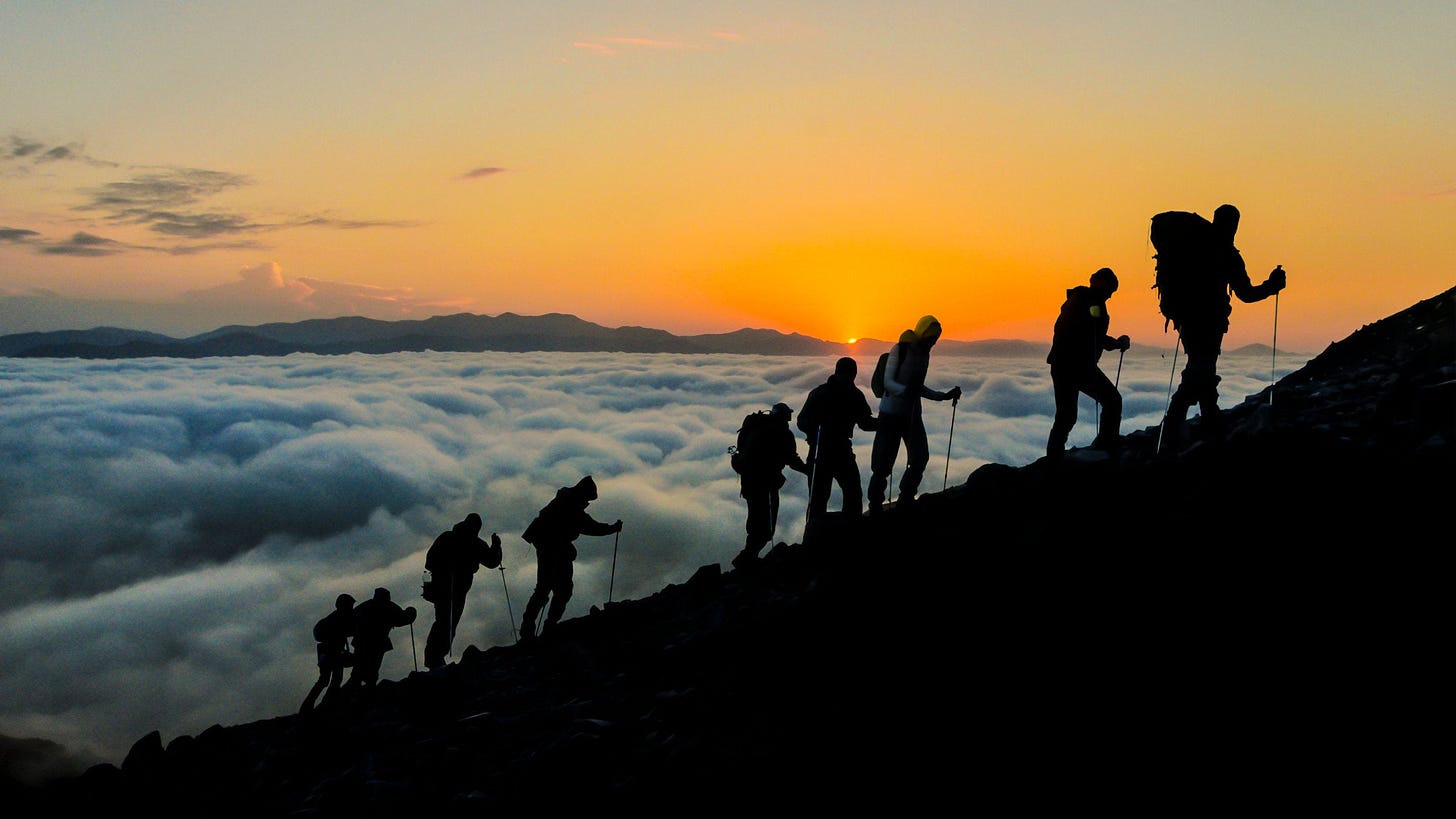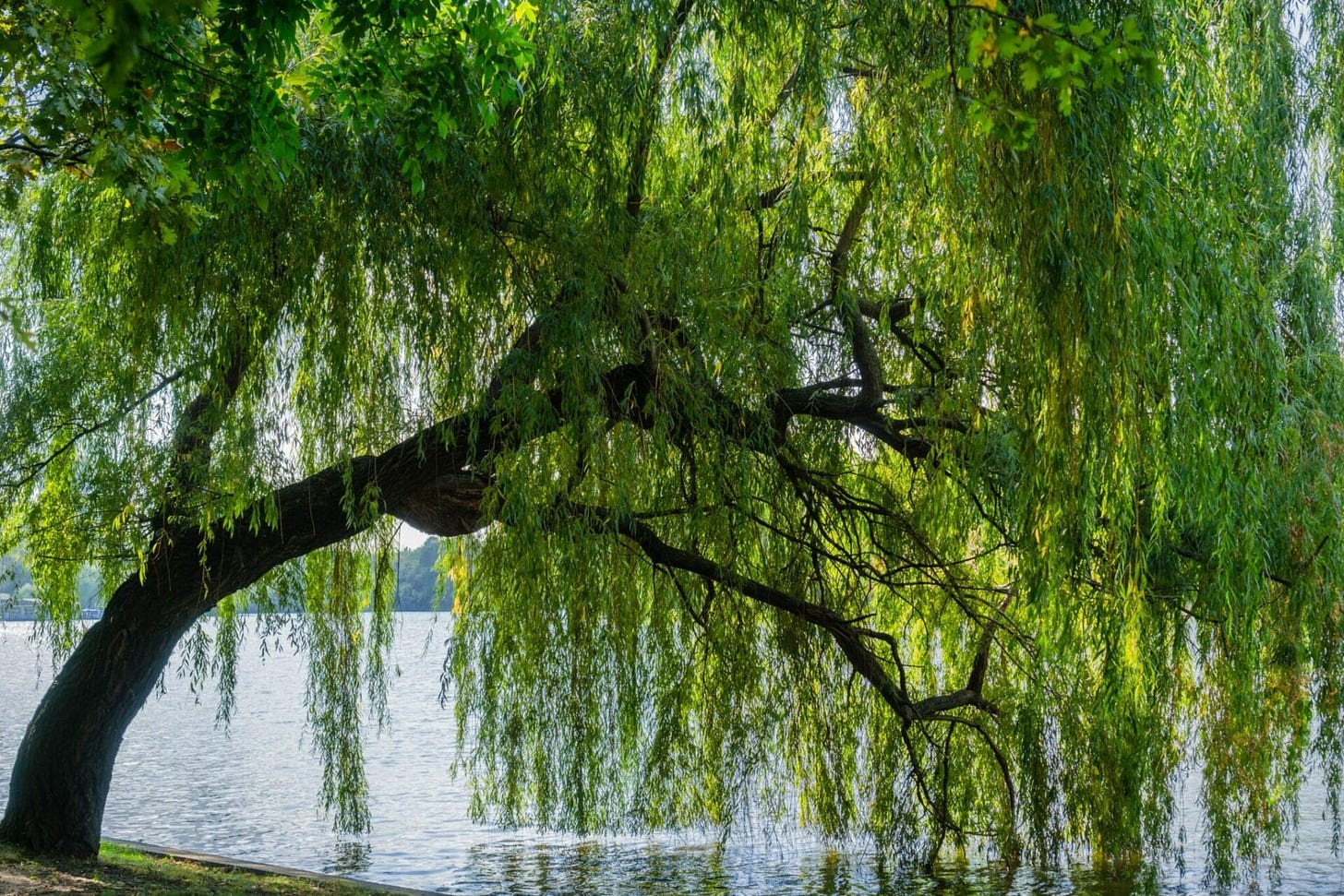how to not burn out while working on climate change
resilience will keep us in the game
In 2019, I experienced burnout. Natural fires in forests have their benefits - they facilitate new growth, for seeds that rely on fire for germination, and clear away organic debris like dead branches, which can fuel more severe wildfires. This is also why not all forest fires should be suppressed, and why we should not always seek to suppress suffering. Akin to the natural process of forest fires, my personal burnout led to renewal and growth.
In August 2019, I texted a friend to found the Harvard Undergrad Clean Energy Group. I gathered friends from renewable energy and climate classes, and defects from corporate sustainability clubs on campus. The climate crisis was here—I spent a summer in sweltering heat in Paris, every year reaching new records—and felt disillusioned by the lack of action on campus and by our university. We were building what we wanted to see entering campus—educational workshops, networks, and community—all dedicated to accelerating the clean energy transition to solve climate change.
I thought I was doing what was needed for climate change: everything I could.
I was wrong.
In reality, I was doing myself and my community a disservice by not taking better care of myself to show up well. By burning out, I could not sustain my contributions and learning. I was spending 20 hours a week on top of everything else to get the club off the ground: recruit directors, garner support from sustainable programs, connecting with speakers, creating opportunities for our members/fellow students. We all need to feel like we can be part of the solution, not solely spectators. That said, spending all your time—in classes and in free time—focused on the destruction of our planet can be a little depressing. Just a little. My casual Saturday reading may have delved into topics like forced climate migration or drought modeling.
I often grappled with the feeling of never quite doing enough—for the group, for myself, for the planet. It was a challenging and emotionally draining conclusion to come to.
Eventually, I had to take a break from leading the club. From winter break through a few months at the beginning of 2020, which everyone knows was such a pleasant time in recent history, I had to completely disconnect.
I felt I had let the team down. I was devastated to not have executed on the projects we laid out.
Thankfully, I had an amazing team. Friends of mine shared the vision so deeply, they stepped up when. (So many people I could name here, but Emilly, Robert, Andrew, and many others in 2020). They carried on the groundwork laid.
In April 2020, I slowly returned to supporting while we were all on Zoom. In 2021, Rohan and I took the helm of the club. While many other student orgs fizzled out in 2020, HUCEG grew exponentially from 2020 onwards. It wouldn’t have happened without the sustained effort of leaders who could take care of themselves.
@Rohan, Sophia, Robert, Emil, Carlie <3 and other amazing directors and members. what a gift it is to know you all. It’s 2024, and we know how this part of the story panned out. Whenever I see new students and initiatives, my heart feels full. I truly hope people realize their own power and potential for change, and to make an impact in a way that feels fun and true to themselves.
Comeback Season
My identity as a strong student and someone who could persist through everything was shaken. I’ve developed a new identity. Persistence is part of the equation, but it is a more mindful and sustainable mindset for this marathon of working on climate. I learned a lot about myself through these challenges. Beyond climate and energy expertise, leadership, my blindspots, to how to show up for each other.
When younger peers have asked for advice, I often share to take care of yourself and find balance.
My story, or at least this chapter of it, is one of rupture and repair. Resting after burnout was needed. I have many other examples of failure, or in this case, near failure—trust me. I asked one of Antora’s co-founders about his relationship with failure. He said his only choice was to become comfortable with failure. When doing things that are hard and that you’ve never done before, you’re bound to fail.
Emotional management, courage, resilience.
Gaining skills to manage not just my time, but my emotions, energy, and mental wellbeing was crucial to staying in the game. Here is my list of activities for wellbeing
exercise
sunlight
time in nature/outside
positive affirmations (the I Am app is wonderful)
practicing gratitude (I list what am I grateful for in my life today—usually, it’s family, friends, health)
meditation (sitting breathing meditation and body scans, 10 minutes a day and longer on the weekend)
sleep hygiene (phone outside of bedroom, sleep before 12:30am)
journal before bed
Not sure who needs to hear this right now, but you’re exactly where you need to be. Every obstacle can be viewed as an opportunity.
Climate change is among the most complex, challenging issues humanities has faced. Could it also be our greatest opportunity to address problems across social inequality, infrastructure, natural processes, culture, and restore our relationship with our planet and each other? Quite possibly.
Resilience will keep you in the game.
We need to stay in the game. It’s going to be hard. Fossil fuel companies are going to throw all their resources in resisting the transition. We’ll need to stay in the game until they accept the inevitable energy transition, because it truly is a matter of life or death. We need to keep the lights on and the factories running (though we could probably do with a little less consumption through smart, sustainable design). While we need fossil fuels to do this in the interim, we also need to electrify ASAP and figure out new ways to provide our materials.
“We will need to spend the rest of our lives managing the atmosphere.” — Spencer Glendon, Probable Futures co-founder. I remember first hearing this from Spencer in Climate and Energy Ventures class, and being incredibly moved. My friend Arina and I talked after class. I felt a sense of support and camaraderie that again made.
What helped HUCEG grow was community support. Clubs like companies like any other organization in my mind, is all about the people. I feel so lucky to have met the people I did, to continue to have them in my life.
Grateful for friends and rooting support system in my life. Zuza, Mel, and Amy, love you guys! Seemingly insurmountable challenges are easier with you all.
Mindsets matter.
How we think about climate change matters. How we think about problems matters. How we view ourselves as agents in tackling, or helping to chip away at, big problems, matters.
“Introspection becomes meaningful action. In Western culture, logical, rational thinking is rewarded more than non-traditional forms of creativity. This enculturation of rationality has set like concrete in the brain networks of most people in spite of neural plasticity because it’s routinely reinforced and guides our perceptions. Rimanoczy suggests alternative ways of thinking and being. […] While there are benefits to analytical thought, it tends to ignore a holistic perspective and interconnections of seemingly unrelated parts, cycles, and larger relations. We now have serious health and environmental issues because of paradigms set up, adopted, and unchanged from at least 50 years ago, patterns that ignored the larger picture of the land, water, and air. A focus on the rational, such as energy production and consumption at any cost, precludes the emotional consequences, like social and environmental implications of climate change.
In my own experience, healthy levels of stress can be reframed as a tool for working to one’s potential. Over the last 9 years, I have been referring to climate change as a climate crisis. The reality is, we are in a crisis. However, is it all that helpful to talk about it as a crisis? Yes, at times. Many friends would argue we must not talk about climate with reticence.
Mindfulness can help people who are working on climate and other, perhaps, emotionally tolling work. I had a great conversation on this with Dom Francks earlier this week. Check out Integrated Wilderness and his program on regenerative leadership, Vivify. Like many of us working in climate, Dom knows well the tension of working on a seemingly insurmountable problem. “"VIVIFY is for who seek balance, aspiring to a life with flourishing relationships, meaningful work, and a thriving connection with nature.” You may have heard of Ikigai. I’m interested in applying Ikigai to flourishing people working on climate. We can all lend out unique gifts to the challenge. Find what incites energy, joy, curiosity for you and you will find a wellspring of energy.
“Mindfulness is generally defined as intentional, non-judgmental attentiveness to the present moment […] may support a fundamental shift in the way we think about—and ultimately act on—local and global economic, social, and ecological crises.”
If we all lived more conscientiously, we’d be awake to what was truly happening around us. We’d more quickly reach the root of our collective climate crisis. We’d be able to collaborate in a mindful manner, and work sustainably on sustainability. We’d be in community, a source of great resilience.
Hope you have a great week!
Related readings:
Can changing your mindset change everything?
The Sustainability Mindset Principles: A Guide to Developing a Mindset for a Better World



